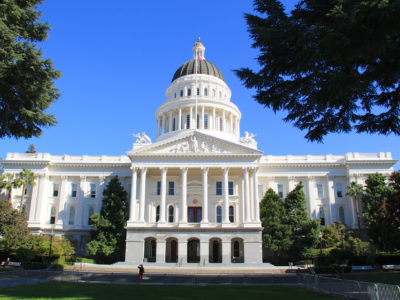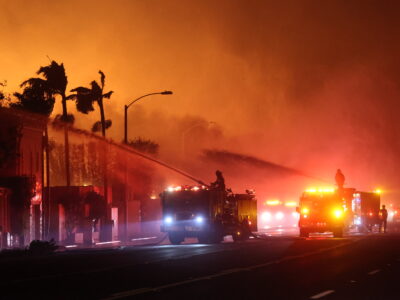Air Quality
Congress Lacks Authority to Review California’s Car Waiver
It’s a complicated issue but the answer is clear: the Congressional Review Act does not apply.
States get many kinds of waivers from the federal government. For example, many states (including quite a few Red states) have received waivers from some Medicaid requirements. Overturning the EPA vehicle waiver would expose all state waivers to the risk of being overturned under the Congressional Review Act, contrary to the plain language of that statute.
CONTINUE READINGTrump’s Seven Most Anti-Environmental Moves — and How to Push Back
There were dozens of actions, all harmful to the environment. These are the worst of the worst.
In the month since he reentered the White House, Trump has dedicated himself to knee-capping environmental protection through a series of executive orders. These orders aim to eliminate crucial environmental regulations, eviscerate key agencies like EPA, arbitrarily halt government funding, and eliminate environmental restraints on the private sector. But these are not done deals, and there are ways of pushing back.
CONTINUE READINGThe California Car Waiver and the Congressional Review Act
Trump has found a possible way to end run California’s legal arguments for the waiver. But there’s no reason to give up.
If the CRA resolution does go through, California should wait until after the midterms, when Democrats are favored to take the House, and then try again with different formulated regulations. When the Trump Administration rejects them, it could then litigate whether the new versions were “substantially the same” as the old ones.
CONTINUE READINGAll the President’s Men
The people occupying environment and energy positions will be anti-regulatory and pro-fossil fuel.
There will be a lot of dramatic fireworks on Day One of Trump’s second term, literally and figuratively. Yet his ability to achieve his agenda will depend on the people he’s chosen to run the government. His energy and environment picks will follow the party line of expanding fossil fuels. Yet they may not be as extremist as their predecessors in the first Trump Administration or as some of Trump’s advisors.
CONTINUE READINGWhy I Still ♥ IRA
Biden’s climate law has already had a dramatic impact.
With over a half-trillion dollars in clean tech investment to date, the Inflation Reduction Act has left an indelible mark on U.S. climate policy. It’s unlikely that Congress will vote to repeal the whole law, given massive investments in GOP congressional districts. But even if they did, there’s no undoing the investments already made.
CONTINUE READINGDid California Policies Make the LA Fires Worse?
California’s environmental and climate regulations did not make the climate-fueled Palisades and Eaton fires more destructive or harder to fight. Here’s why.
We know climate change is partly to blame. Are California’s environmental policies regarding land and water management also to blame for the supercharged firestorm that has ravaged Los Angeles? It’s not just conspiracy theories on social media or misguided news stories; that’s the position of some congressional Republicans and President-elect Trump, who hold power over future …
Continue reading “Did California Policies Make the LA Fires Worse?”
CONTINUE READINGLA Fires and the Climate Connection
New UCLA research connects the dots between the climate crisis and the supercharged LA wildfires. “Hydroclimate whiplash” means worse floods, droughts, and fires.
Like millions of Angelenos, I’ve been staying indoors and off the roads, glued to the Watch Duty app, radio, and TV coverage as LA is engulfed by these historic fires. The last 48 hours of coverage has focused, understandably, on the firefight and immediate devastation. Now, it’s time to start hearing about the climate connection, …
Continue reading “LA Fires and the Climate Connection”
CONTINUE READINGGovernment by Reconciliation
The reconciliation process avoids the risk of a Senate filibuster. But it comes wth procedural and political complications.
The GOP’s efforts to accomplish a big agenda through the reconciliation process will face serious complications. The Byrd rule limits the use of reconciliation to achieve non-budgetary purposes. A razor-thin House majority and factional warfare will make it hard to reach deals, as will Trump’s (& Musk;s) distaste for compromise.
CONTINUE READINGTrading more LNG exports for more electricity transmission?
Recent Department of Energy report indicates that the trade may be worth it
In a series of recent posts (first post, second post, third post), I examined the permitting reform bill advanced by Senators Manchin and Barrasso in the last Congress. That permitting reform bill is now dead. But the reasons for doing a deal still remain. Decarbonizing the US economy requires a massive increase in renewable energy, …
Continue reading “Trading more LNG exports for more electricity transmission?”
CONTINUE READINGTesla’s Trajectory
What do recent developments teach us about the world?
Recent news about Tesla sheds light on the company’s future, the global EV market, crony capitalism, not to mention the state of American democracy. It may also say something about Elon Musk’s role in the company. That’s a lot of information wrapped up in Tesla’s stock prices and related developments. Overall, this is good news for the environment but bad news for democracy.
CONTINUE READING








